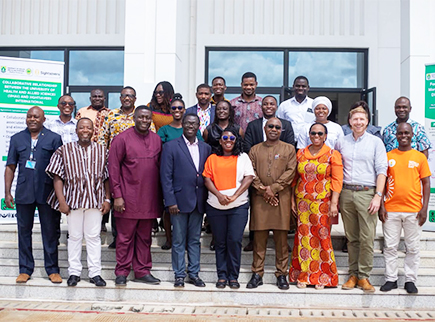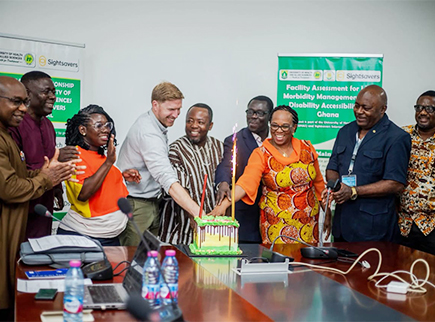The University of Health and Allied Sciences (UHAS) in partnership with Sightsavers and the Ghana Health Service (GHS), has launched a Facility Assessment for Lymphatic Filariasis Morbidity Management and Disability Accessibility in Ghana Project.
This was done at a kick-off stakeholder meeting hosted by the Centre for Neglected Tropical Diseases Research of the Institute of Health Research (IHR) at UHAS.
It was to officially launch a new collaborative initiative focused on developing and evaluating an integrated health facility assessment tool for Lymphatic Filariasis (LF) morbidity management and disability accessibility in selected LF endemic districts in Ghana.
The partnership between UHAS, Sightsavers and GHS, purposed to integrate disability and facility assessments into broader Neglected Tropical Diseases (NTDs) control efforts in Ghana.
Dr Alfred Kwesi Manyeh, the Director of the Centre for Neglected Tropical Diseases Research at UHAS-IHR and Principal Investigator on the project, gave an overview of the UHAS-Sightsavers collaboration.
He outlined key focus areas of the partnership, including joint research on NTDs control, internship opportunities for students, and comprehensive assessment of service delivery systems.
He said the collaboration would significantly enhance UHAS’ research profile and directly benefit communities through evidence-based interventions.

Dr Richard Selby, the Head of Portfolio for NTD Research at Sightsavers and Co-Principal Investigator of this project, gave highlights on the National LF Morbidity Management Strategy.
He underscored the urgency of assessing the readiness of health facilities to provide hydrocele and lymphedema services, particularly as Ghana approached an LF elimination threshold.
Dr Selby said identifying infrastructure, financing and human resource gaps would be critical in improving healthcare delivery and ensuring that health services were inclusive and effective.
Representing Sightsavers Ghana, Mr Gilbert Asante, reaffirmed the organisation’s commitment to inclusive health research and programming.
He said the integration of disability assessments into the LF morbidity study was not only innovative but essential in ensuring that no one was left behind in the provision of holistic healthcare and expressed optimism for future collaborations beyond the current project.
Professor Frank Edwin, the Pro-Vice Chancellor of UHAS, expressed his appreciation to all stakeholders, saying he was confident in the partnership to address this critical aspect of healthcare for people with NTD-related disabilities.
Professor Kwame Ohene Buabeng, the Dean of UHAS School of Pharmacy, who doubles as the Acting Director of UHAS Institute of Health Research (UHAS-IHR), provided an overview of the mandate of the Institute, highlighting its commitment to conducting cutting-edge research into public health problems through multidisciplinary approaches.
he Chairperson for the occasion, Professor Evelyn Korkor Ansah Professor of Clinical Epidemiology at UHAS-IHR Centre for Malaria Research, among others, emphasissed the importance of strategic collaboration in tackling NTDs and strengthening primary healthcare systems.
The UHAS-Sightsavers collaboration sets the tone for a rigorous, multi-level health facility readiness assessment for NTD-related disabilities, which is expected to inform national policy and service delivery strategies for LF morbidity management. This keeps UHAS on the course of driving impactful research and partnerships that advance the national health agenda and contribute to the well-being of communities across Ghana.

